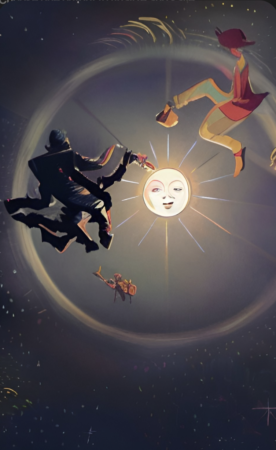
“The Sun We All Revolve Around” – Callum Quinn, © 2022
Semi-recently I caught myself getting wrapped up in, of all things, a sitcom from the early 2010s. Not one to quickly get involved in a new show—particularly a sitcom, particularly post-millennium—you can imagine my surprise when my immediate attention kept drifting from my spaghetti prepping to the TV screen. It was something my brother had brought back from our latest visit to our home town: the complete series of Hot in Cleveland, starring Wendy Malick, Valerie Bertinelli, Jane Leeves, and the absolutely timeless Betty White. The series follows three middle-aged and single LA ladies who crash-land in Ohio and suddenly find themselves the centers of male attention—a scenario that lies in complete opposition to the impossible standards of LA living. Realizing this is an opportunity too good to waste, the ladies pack up their lives in LA and start anew in Cleveland.
This show puts much of its focus on friendship and positive change, but it also emphasizes the idea that, sometimes, who we are is just enough. And nowhere is this better demonstrated than in the character of Victoria Chase: a has-been soap opera star whose life revolves mainly around herself and whatever stage she happens to be standing in the center of. Victoria is completely self-involved, tactless, shallow, and unnecessarily flamboyant. And I love her.
A good portion of that love stems from the absolute comedic gold a narcissistic has-been character brings to the situation (and, of course, the beautiful Wendie Malick’s colorful interpretation of her). Throughout the show we see Victoria’s schemes for achieving her own personal success unfold in a variety of outrageous ways. For example: when she disguises herself as a senior citizen in a Tootsie-esque plot to get a role in a play; her faking of a horrid, fatal disease in the hopes of winning a sympathy Oscar; and, in one notable episode, her attempt to “poison” frenemy and fellow soap opera actress Susan Lucci (played by the elegant soaps queen herself).
However, the rest of that love stems from Victoria’s extreme level of confidence in herself. And while she is borderline conceited in that confidence, there are many things we can learn from the way she presents herself. For one thing, Victoria Chase demonstrates that self-worth is an achievable goal. Many people struggle all throughout their lives to reach what Victoria has: a strong sense of importance and security in who they are and what they want. In fact, some people may never reach this level of self-assurance. Yet Victoria seems to come to it naturally, and in watching her we can get a sense of where this same confidence can be applied to our own lives.
She also, on occasion, proves her ability to prioritize what really matters in the long run, and this is what redeems her, even from the very depths of her selfishness. For example, while she may forget to set Joy up with a date for her birthday, she knows enough about her friend to hire someone last minute to act the part of her dream man. She also eventually chooses to donate her kidney to a little girl in need—brushing aside her own fears and insecurities in the process. And, of course, the simple fact that she has friends in the first place is proof enough she knows how far her self-absorption can go before it gets to be too much.
As a modern fictional character, Victoria may not strike viewers as the perfect role model—or, even, a good one. But what she brings to the screen is reminiscent of any other flawed, but lovable, character. While we know that what she does may sometimes be insensitive, amoral, selfish, and narcissistic, we can hardly blame her for living her best life as her own biggest fan.
Furthermore, Victoria Chase epitomizes the belief that no matter who you are—be it sweet or bitter, shallow or profound, selfless or selfish—at the very least: own it. And flaunt it for all it’s worth.
— C.O.





